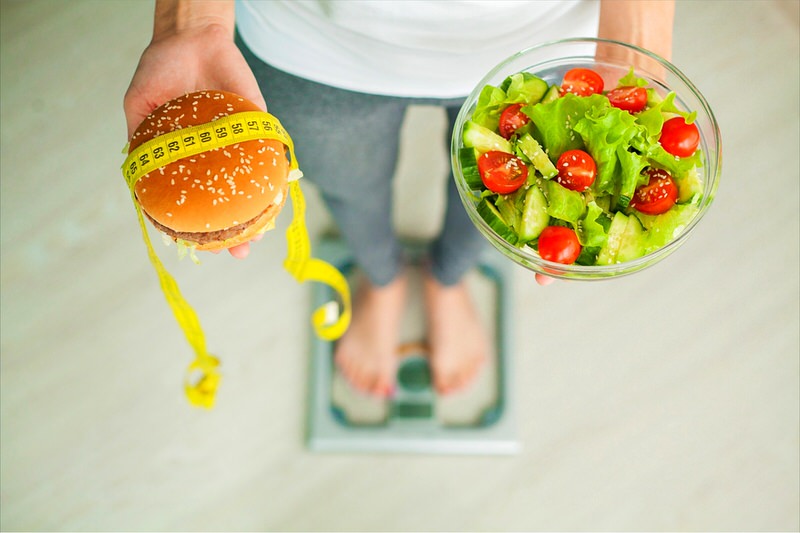The reasons behind feeling fatter even though you’re losing weight could be due to not sleeping, water retention, losing water weight, alcohol, stress, calorie restriction, or infrequent workouts. You need to focus on regular exercise and include healthy foods in your diet not to lose your body mass but body fat. Body dysmorphia or phantom fat is another severe issue where the person’s reality doesn’t match their beliefs. In such cases, professional help is a must.
A weight-loss journey for every person is different and personal. Many factors go into losing weight, like body shape, body mass index, metabolism, inches, etc.
Although the ultimate goal should always be to feel fitter and better each day, things change when you start feeling like the more weight you lose, the fatter you feel.
If this is how you truly feel after watching yourself in front of the mirror, there could be a severe issue you’re dealing with, like body dysmorphia. Or several factors are making it impossible for you to feel that you lost some weight truly.
Let’s take a look at these reasons responsible for making you feel this way and try to narrow down your particular issue with your body!
Losing weight but feeling fatter
Exercising every day is beneficial to our bodies in multiple ways.
Not only it improves our mood significantly, but it also helps us feel fitter and better in our day-to-day lives. It’s great when we can finally see changes in our body and the scale starts showing all our hard work by going down.
But at the same time that you’re losing body weight, you might also feel fatter. It does feel like you’re slimming down, but why doesn’t your body feels lighter and fitter as it should be? It does make a person feel dissatisfied and bad about themselves.
This is why there’s a difference between losing weight and slimming down. We all have two different types of fat, where one is body fat, and the other is fat-free mass or lean body mass.
When you’re losing weight, it could just be that you lost water weight or muscle mass. What you should be losing is excess body fat.
Reasons why you feel fat even though you lost weight

1. Not sleeping enough
After exercising regularly, your body needs enough rest in the form of deep sleep during the night. This is when your muscles recover, heal, and grow. In addition, a night of good sleep is essential for keeping our hormones regulated and our body feeling refreshed the next day.
It also keeps in check our hormones responsible for feeling full (leptin) and getting hungry (ghrelin).
If any of these hormones are affected, your diet gets directly affected. As a result, you consume more food or a lesser amount of food than your body requires, affecting your body shape.
2. Water retention
Water retention is a real deal when it comes to feeling bloated or feeling fatter than usual when you’re actually losing weight.
It might happen due to hormonal imbalance, obesity, kidney problems, and so on. As a result, you’ll see weight gain, obesity, puffiness, or bloating.
3. Losing water weight
Your body may show that you’re losing weight, but there’s no loss of inches, which occurs when you lose water weight.
Water is a huge component of your body, just as food is, and the scarcity or excess of it can make it seem like there’s a weight gain when it’s not. If you used to weigh a lot before and have lost a bunch of weight now, perhaps you’ve just lost your water weight.
4. Alcohol consumption
Anyone trying to become the better version of themselves by losing weight knows that alcohol consumption is only a hindrance to achieving your goals. Alcohol directly affects your belly, making it look protruding by particular weight gain in that area.
If you mix alcohol with other sweetened drinks, it’s all the more difficult to look slim. Abdominal fat is a very stubborn kind of fat to lose for every person out there.
Drinking alcohol only makes the situation worse. So, reducing the frequency of alcohol consumption will help you out in the longer run.
5. Increased stress
You might be wondering how stress is responsible for making you feel fatter. How we live in our day-to-day lives affects our body and mind immensely. So if you’re generally living a happy life, it’ll show on your body too.
But if you have stress, usually arising from work, it affects your body in various ways like high blood pressure, chest pain, stomach issues, headaches, and lowering your metabolism.
The stress hormone called cortisol affects your body to great lengths. It affects your body and increases belly fat, making you look fat even though you lose weight. It also shows up in ways like breakage of the skin or getting pimples. It might lead to an increase in abdominal fat.
6. Calorie restriction
But the only sure way of losing weight is by giving up on anything with a lot of calories and just living on salads for the rest of your life? Absolutely not. If you think consuming fewer calories will make you lose weight, you couldn’t be more wrong.
With extreme calorie restriction, you might end up losing your muscle mass. It will also affect your metabolism in the long run, making it difficult to burn body fat with time.
There needs to be a balance of everything in your diet. Eating in moderation is the key to losing weight healthily. In the beginning, your body might lose a couple of pounds from consuming lesser calories, but it’ll negatively impact your overall health after some time.
7. Infrequent workouts
Exercising is a part of a lifestyle that you should follow for the rest of your life. Be it any exercise you indulge in, and it should be regular (at least 4 times a week). When you start exercising in the beginning and have a calorie deficit diet, you’ll see yourself losing a bunch of weight.
But if you become infrequent with your workouts and maintain the calorie deficit diet, you’ll start losing muscle weight. So even though you’re losing weight, it’s your muscle mass, not your body fat. But in the end, you’ll feel fat and in no way fitter or better.
8. Keep patience
It’s a journey to achieve your weight loss goals. You can’t expect to reach your ideal weight in a month or even a few months. Only by putting your body in motion by exercising and generally remaining active will you get to see results. Your expectations should match your reality to achieve your goals.
Ways to not feel fat when losing weight

- Fix your sleeping habits by focusing on achieving deep sleep every night. Reduce your electronics usage and focus on activities that will help you attain a peaceful sleep. You can start meditation, journaling, or reading books.
- Reduce your sodium intake to avoid water retention. Avoid processed foods as they are the number one reason responsible for water retention.
- Keep yourself hydrated enough by consuming the water needed by your body. Have a balanced diet that will accommodate your water requirements. Always have a lukewarm glass of water before breakfast.
- Reduce your intake of sweetened drinks and alcohol. Try to include tea and lemon water as part of your lifestyle.
- Try to avoid stressful situations and maintain an overall happier life for yourself. Your stress can affect your body majorly is not dealt with.
- When losing weight, you need to lose it slowly and healthily. This includes making healthy progress with your diet. A calorie deficit diet should only reduce your calories and not have a drastic fall in calories.
- Be consistent with your workouts to reach your goal weight. Maintaining an overall healthy diet will aid your weight loss efforts.
Phantom fat

Phantom fat is a more general term used around, but the medical term is body dysmorphic disorder. When a person is losing weight, but when they look at themselves in the mirror, they feel fat, heavy, and even ugly. Over time, this disorder can take over their self-image and not just weight.
People with this disorder would constantly check themselves in the mirror, seek validation from others, and always compare themselves with others. For them, the weight scale might be telling them they’re losing weight, but they still feel fatter.
It’s not about weight; it’s about how we perceive ourselves, which is a product of our beliefs, past experiences, relationships, culture, and behavior. It’s more frequently occurring in people with a history of depression and obsessive-compulsive disorder (OCD).
How to recover
People with this disorder need to deal with different aspects of their life from where this disorder could have stemmed from. They might even need therapy and receive help from professionals to deal with their issues.
It would help if you started viewing your body as a whole instead of focusing on one particular body part and finding faults in them. When you view your body as a whole, you’ll see how great you’re and accept yourself that way.
Internal happiness needs to be focused on, and when that happens, you’ll feel external happiness about your body too.
FAQs
Does fat get flabby when losing weight?
When you lose excess weight, sometimes your skin can’t bounce back and shrink. Our skin stretches to incorporate the fat in our body. So when we gain weight or reduce it, we might be left with stretch marks and flabby skin.
What is skinny fat?
Skinny fat is a term used to describe a high percentage of body fat and low muscle. This might happen when you restrict your calories and lose weight through this medium instead of following a healthy workout diet balance.
What is reverse body dysmorphia?
Reverse body dysmorphia is a belief where people think their bodies are petite or too skinny, insufficiently muscular, or lean. They might be in good shape, but they believe they still need to get bigger and gain more muscles—just the opposite of body dysmorphia.
Why do I weigh so much but don’t look it?
You might be gaining muscle weight when you focus on strength training and not doing enough cardio, leading to losing body fat. As a result, your body is getting leaner and fitter because of all the muscles you’re gaining, but you aren’t losing any weight.
To summarize
Exercising is a good habit that you should make a part of your lifestyle. Everyone has different goals for looking fitter and better, and there are various ways to achieve them. If your focus is on losing weight, cardio and a calorie deficit diet are the way to go. But sometimes, even though we’re losing weight, we still feel fat.
There are various factors which we need to be considerate about when trying to lose weight. But sometimes, it could also be a serious reason behind such a feeling termed body dysmorphia. So, keep your goals in mind and try to align your reality with them. If your beliefs do not match your reality, professional help is the way to help you achieve that.


